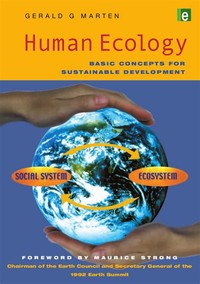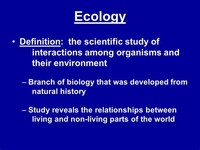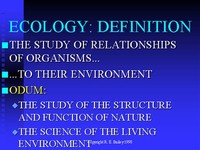Facts about Ecology

Human ecology began in the 1920s, through the study of changes in vegetation succession in the city of Chicago, Illinois.

Several of the basic concepts of ecology include ecological units, the ecosystem, energy flow, nutrient cycles, species interaction, productivity, and ecological challenges.

Some consider the ecosystem (abbreviation for "ecological system") to be the basic unit in ecology.

Nonetheless, ecological thinking at some level has been around for a long time, and the principles of ecology have developed gradually, closely intertwined with the development of other biological disciplines.

The interactions between living organisms and their abiotic and biotic environments, the focus of ecology, generally convey an overall sense of unity and harmony in nature.

Other historical schisms were between organismal and individualist ecology, holism versus reductionism, and theoretical versus applied ecology.

Ecology is usually considered a branch of biology, the general science that studies living and once-living organisms.

The term ecology (oekologie) was coined in 1866 by the German biologist Ernst Haeckel.

Pioneers in animal ecology were early twentieth-century scientists R. Hesse and Charles Eton, Charles Adams, and Victor Shelford.

By the nineteenth century, ecology blossomed due to new discoveries in chemistry by Lavoisier and Horace-Bйnйdict de Saussure, notably the nitrogen cycle.

Ecology is the science that studies living organisms and their interactions with the environment.

Agriculture, fisheries, forestry, medicine, and urban development are among human activities that would fall within Krebs' (1972: 4) explanation of his definition of ecology: "where organisms are found, how many occur there, and why."

Ecology is generally spoken of as a new science, having only become prominent in the second half of the twentieth century.

Ecological factors that can affect dynamic change in a population or species in a given ecology or environment are usually divided into two groups: biotic and abiotic.

Ecology or ecological science, is the scientific study of the distribution and abundance of living organisms and how these properties are affected by interactions between the organisms and their environment.

Ecology is a broad science which can be subdivided into major and minor sub-disciplines.

Ecology is a very broad-ranging and complex topic, and even its definition lacks consensus.

The word is derived from the Greek oikos ("household," "home," or "place to live") and logos ("study")—therefore, "ecology" means the "study of the household of nature."

Ecology may be more simply defined as the relationship between living organisms and their abiotic and biotic environment or as "the study of the structure and function of nature" (Odum 1971).

The first principle of ecology is that each living organism has an ongoing and continual relationship with every other element that makes up its environment.

The development of human ecology led to the increasing role of ecological science in the design and management of cities.


